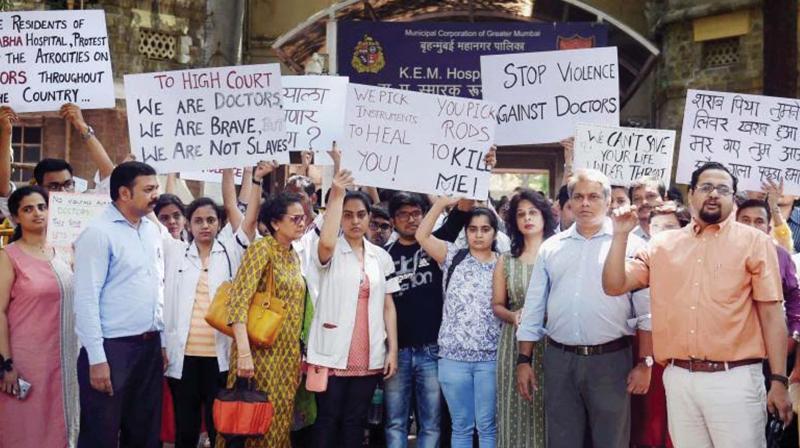The pill that fails to save doctors
The doctors attribute the low rate of registration of cases and conviction to police failure to invoke the relevant sections of the Act.

THIRUVANANTHAPURAM: *A drunken patient attacks a doctor on duty at Alappuzha General Hospital on April 8 this year for no reason. A complaint was registered with the police but there has been no follow up. *A year back, a chronic cardiac patient died at the residence of a doctor in Alappuzha when he went there to meet him. The relatives of the patient attacked the doctor, which resulted in him sustaining serious injuries warranting an admission in the intensive care unit. *Relatives of a patient attacked a house surgeon in Jubilee Medical College, Thrissur, in 2012. These are some from the series of incidents that happened in Kerala where medical professionals were at the receiving end for no fault of theirs. Hospitals and medical professionals in the state continue to remain vulnerable to frequent assaults and attacks from outsiders despite a stringent law brought in by the state government five years ago.
Under the Kerala Health Service Persons and Health Care Services Institutions (Prevention of Violence and Damage to Property)Act 2012, attack on a duty doctor, a hospital or its staff would invite an imprisonment of up to three years and fine of Rs 50,000. Under the law, the act of violence is described as injuring, endangering life, intimidating or obstructing health care giver. Registered medical practitioners functioning out of medical institutions, nursing professionals and para medics all come under the category of health staff. But there has been no perceptible change on the ground as far as security is concerned, because of weak enforcement. “Only less than 10 cases have been registered under the Act. There’s is only one conviction,” said Dr A.V. Jayakrishnan, former state president of IMA. The doctors attribute the low rate of registration of cases and conviction to police failure to invoke the relevant sections of the Act. Most cases are treated as petty clashes between groups. If there is a complaint from the doctor, there will be a counter from the attackers as well.
“The routine formula is to register petty cases against 50 or more identifiable persons. The police often treats these cases the way it handles college rivalries,” lamented Dr Jayakrishnan. Doctors say those unleashing violence against doctors are rarely close relatives of the patients. Even habitual offenders and petty politicians are involved in many cases. Most people rush to the restricted areas which lead to overcrowding and chaos in casualty. It can be partially controlled by restricting the entry of unwanted people. But this may not be possible in small hospitals. According to Dr K.A. Raoof, general secretary Kerala Government Medical Officers Association (KGMOA), even policemen and advocates lack knowledge about the hospital protection law. “Steps are needed to create awareness among medical professionals and citizens. There is a need to put up boards displaying details like punishment and penal action under law. CCTV cameras have to be installed outside casualty wing,” he added.
It was because of the series of attacks on doctors that various organisations had demanded the protection law. “Usually when a government office is attacked or a government official is assaulted on duty, the police register case of trespass. But hospital being a public place, people cannot be booked for trespass which is a non bailable offence,” said Dr Jayakrishnan. The junior doctors who are at the receiving end in such incidents say nothing has changed on the ground. “As house surgeons we conducted an agitation in 2007 demanding protection for doctors. Ten years down the line nothing much has changed,” said Dr Rahul U R, secretary, Kerala Medical Post Graduate Association (KMPGA).
“A colleague of mine informed the relatives of a young patient that his blood results indicated malignancy. The shocked relatives could not accept the truth and pounced on the doctor. Such attacks take place unexpectedly,” he said. Recently a baby who was suffering from a congenital disease died due to bleeding. The doctors extracted tissue from the liver of the infant for biopsy. All of a sudden the relatives started raising a hue and cry, alleging that the needle used for extracting the tissue was responsible for infant’s death. “We work under extremely tense circumstances,’’ said Dr Rahul. After the attack on a doctor at Arookuty in Alappuzha last year in a mob held him hostage for over seven hours, the government had resolved to protect hospitals and health care professionals. But despite these announcements, the attacks on hospitals and medical professionals continue unabated in the state.
There are many reasons behind such attacks, says Dr P.S. Jinesh, assistant professor, Government Medical College, Kottayam. “They can be lack of facilities in hospitals, the unruly behaviour of drunken patients and relatives, the deep disappointment in case of the death of a patient, the lack of communication between the doctor and the patient, and in certain cases, the brash behavior of the doctor,” says Dr Jinesh. Apart from the strict enforcement of the law, an attempt to improve facilities and resources as well as developing a better patient-doctor relationship are urgently needed to stem the trend, he said.

